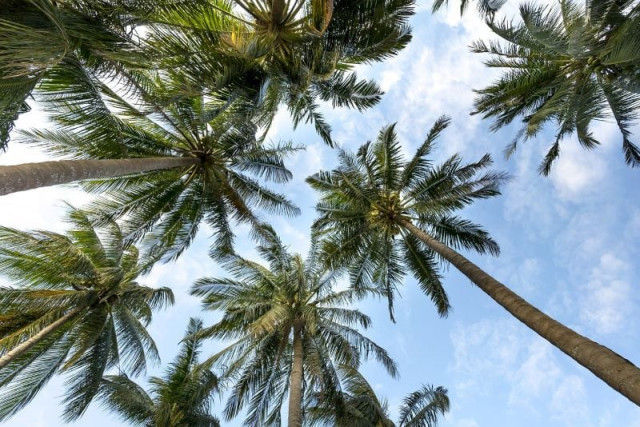Costly palm trees rot in Khyber-Pakhtunkhwa
Environmentalists argue drought-resistant trees incompatible with biodiversity needs

Pakistanis in general often have an obsessive fascination with anything and everything foreign, be it a luxury perfume, an imported automobile or even an ordinary box of wheat cereal. Yet when palm trees, native to the coastal areas of Gulf countries, start appearing randomly around the marketplace in landlocked Peshawar, one can tell that this crazy adulation has seeped into the state's power structures as well.
The Peshawar Development Authority (PDA) has abruptly started planting costly palm trees across K-P without any research on their contribution to the environment or their impact on the biodiversity and ecological system of the province. Unsurprisingly, due to their lack of compatibility with the local environment of the northern province, the palm trees costing Rs800 to Rs12,000 each, have started showing signs of devariegation, with their leaves turning pale due to the lack of water.
"The government has imported this idea from Dubai for the personal benefit and commission of the planners. They have ignored the native plant species and have imported foreign plants, which have no role in the local environment. Just a few native plants are grown in Peshawar, causing it to turn into a concrete jungle. Furthermore, the timber mafia is also active in the province while deforestation has also occurred in Malakand, Dir and other hilly areas. Although the government ousted the minister over the large-scale deforestation, still no one was held accountable for the destruction of trees," said Dr Adil Zareef, Convener of the Peshawar Clean Air Alliance and the Sarhad Conservation Network.
Similarly, Dr Saima Hashim, Associate Professor at the University of Agriculture, Peshawar revealed that palm trees, which were known to be drought tolerant, still required significant amounts of water, which was already scarce in Peshawar. "Furthermore, palm trees are relatively inefficient for carbon absorption, offering limited resources for local wildlife. Hence, they attract fewer birds and insects compared to native or flowering trees that support local biodiversity. Choosing native tree species over palm trees would better sustain Peshawar's urban ecology by providing food, shelter and nesting spaces for various species," claimed Dr Hashim.
Dr Hashim further informed that 20 feet queen palm trees costing approximately Rs8,000 to 15,000 were purchased from either Lahore or Dubai. "The ideal planting duration for these plants is from February to March therefore the current season is unsuitable. Our water levels are already down, and the government is planting palm trees which need huge amounts of water. These plants are unfamiliar with our soil and only serve the sole purpose of beautification," she claimed.
Speaking to The Express Tribune on the matter, Director of Horticulture at PDA, Manzoor Yousaf highlighted the beautification purpose of the trees, which he believed were not only planted in Peshawar but also in other cities like Lahore, Islamabad and Karachi.



















COMMENTS
Comments are moderated and generally will be posted if they are on-topic and not abusive.
For more information, please see our Comments FAQ